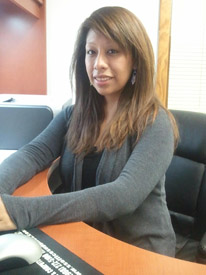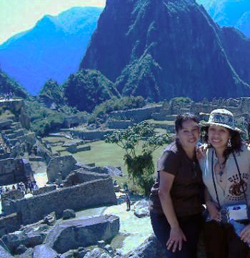
Read more profiles of the Class of 2012
The concern Angela Centellas has for helping senior citizens maintain their independence can be traced back to her childhood in Peru.
Raised by her grandparents for the first years of her life, Centellas moved to New Jersey with her mother when she was 5. Her grandparents followed a few years later, and as little as Centellas was, she could see how they struggled in their new surroundings.
Her hometown of North Plainfield was not as conducive to keeping generations of families together.
“My family is really close, that is how my culture is, your aging relatives stay with you,’’ said Centellas, who graduated as a public health major this month from the Edward J. Bloustein School of Planning and Public Policy. “That is not how I perceive things here. The way communities are designed are not aging-senior friendly.’’
Centellas, 23, wants to pursue a career that merges public health and planning and is waiting to find out if she was accepted to graduate school. Her goal is to help towns develop in ways that make it easier for older residents to “age in place.” That could require simple measures such as building sidewalks and maintaining parks. It could also involve some complex changes that include expanding public transportation and building single- story housing to allow seniors to stay in their communities and live alongside younger neighbors.
“I don’t see why you should lose your autonomy as you grown older,’’ Centellas said. “I know there are things that you might not be as capable doing as when you were younger. But the point is, if you want to stay close to your family, you should have that choice.’’
While in high school, Centellas volunteered at a nursing home and worked at a children’s daycare center – which is when she realized how much more she connected with senior citizens. Her grandfather suffers from diabetes and was diagnosed with cancer, which has heightened her awareness of the health concerns and needs of an aging population.
Centellas started college studying biomedical engineering at a university in New York. She considered pursuing a career in prosthetics as a way to help seniors maintain their independence. But she decided she wasn’t interested in engineering and transferred to Rutgers in her sophomore year to study biology. That is when she took a public health and policy as an elective.
“I didn’t even know public health existed,’’ Centellas said. When she took the class, she said she realized, “this is exactly what I want to do.’’

Centellas and her grandmother
She was drawn to working on policy issues because she saw it as a way to help a broad range of people. And her experience living in Peru taught her that communities can be designed in ways that make life easier for senior citizens.
In Peru, her grandmother could take a bus anywhere she needed to go. Markets that sold fresh food were a short walk from home. But in North Plainfield the bus only takes residents to New York City or a shopping mall, and the ride is expensive. If no one is home, Centellas said her grandmother is stranded. The nearest farmers’ market is off of a highway and only accessible by a car. The next closest store to buy food is a Walmart, which is also off the highway.
“My grandparents always complain they can’t get fresh food like they used to in Peru,’’ Centellas said. “But my grandmother can walk two blocks down and find a McDonald’s. That is a problem.’’
Centellas has been working on a project to plan healthy communities as an intern at the New Jersey Department of Health and Senior Services. She said she was interested in working on the initiative, which teaches planning and zoning board members about the connection between land use and health, because it includes a section on issues that affect senior citizens.
She said she has read articles about the aging baby boomers, and how quickly the population over the age of 65 is expanding, and wants to help communities prepare.
“We are all going to get there eventually,’’ Centellas said. “It’s a solution that will affect everybody, if not immediately, than eventually. We have to think about this.’’


